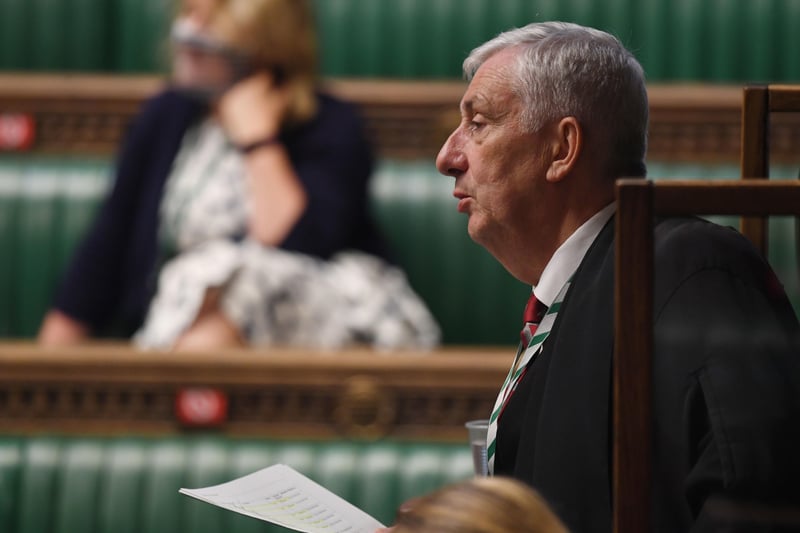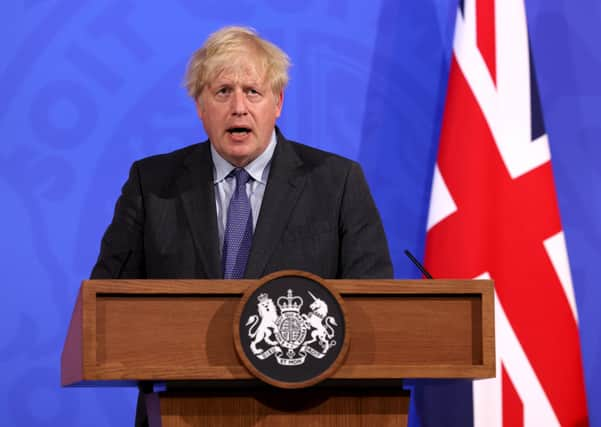He would have possessed even less grasp of the facts than ‘‘hopeless’’ Matt Hancock when the Health Secretary updated MPs at 8.30pm – two-and-a-half hours after the Prime Minister held his Downing Street briefing.
Hancock’s appearance was memorable for two reasons – the hostile questioning from MPs on all sides was a reminder of past Brexit battles and Speaker Lindsay Hoyle’s abject fury at Johnson circumventing Parliament yet again.
Specifically, the Speaker admonished the PM, and government whips like Pudsey’s self-serving MP Stuart Andrew who was present on the green benches, for breaching the Ministerial code.
The document could not be clearer: “When Parliament is in session, the most important announcements of Government policy should be made in the first instance, in Parliament.”
Yet, while Andrew pootled about trying to look useful, this matters. The Ministerial Code was introduced in the 1990s when John Major’s then government became engulfed by a succession of sleaze scandals.
Now each new Prime Minister is effectively required to write a new code of ethics – and Johnson wrote the foreword to the current Code in August 2019. In it, he promised to “uphold the very highest standards of propriety” while cautioning Ministers against seeking “to stall the collective decisions necessary to deliver Brexit” – a nod to contemporary events.
Yet, while it includes a renewed commitment to the seven principles of public life first set out by Lord Nolan in 1995, the whole exercise is meaningless because the arbiter for the Ministerial Code is the Prime Minister rather than the Speaker or Parliament.
This explains why Johnson kept Home Secretary Priti Patel in post despite an inquiry concluding that she bullied staff; this when the Code specifically states that “there must be no bullying and no harassment” by Ministers.
This also demonstrates why the Speaker had to use his personal fury to rally MPs when Johnson was a no-show at Parliament – his anger at such contempt masked the very limited powers at his disposal.
And this illustrates the frustration at MPs when Ministers – and Chancellor Rishi Sunak continues to be a notable culprit after absenting himself this week from a statement on Treasury support for the hospitality sector as lockdown restrictions are extended – do not give statements when demanded.
Yet the solution is remarkably simple. Responsibility for the Code’s enforcement switches from Downing Street to the Speaker – or a special Commons committee that is representative of the make-up of Parliament.
It’s called ‘‘taking back control’’ – the very notion that Johnson and his Brexiteer acolytes were actually articulating on this weekend five years ago as the sovereignty of Parliament became a key plank of their ultimately successful campaign to persuade Britain to leave the European Union.
What’s there to oppose if Ministers – and this Prime Minister – are still committed to upholding “the very highest standards of propriety” and ensuring that major decisions are scrutinised rather than being made up on the hoof?
EVEN though the decision not to fully fund the schools catch-up plan is one of the most significant – and fundamental – to have been taken by the Government, it fell to Schools Minister Nick Gibb to explain the situation to MPs.
Pressed by Labour to release the correspondence between the Department for Education, and the Treasury which vetoed plans put forward by schools catch-up tsar Sir Kevan Collins who has since quit, Gibb chose to quote these lines from Tony Blair’s autobiography.
“Governments, like any other organisations, need to be able to debate, discuss and decide issues with a reasonable level of confidentiality. This is not mildly important. It is of the essence.”
Yet the very latest Ministerial Code says: “Ministers have a duty to Parliament to account, and be held to account, for the policies, decisions and actions of their departments and agencies.”
Once again, I can only conclude that Chancellor Rishi Sunak is desperately trying to distance himself from this controversy after blocking the Collins blueprint because he doesn’t want to damage his public persona.
If I’m wrong, I am happy to stand corrected once the Treasury has provided the necessary evidence to the contrary. But I also note that the Treasury chose not to put up any Minister – not even one of Sunak’s junior ministers – to respond to this week’s debate in the Commons.
TALKING of Rishi Sunak, his absence from Parliament on Wednesday could be explained by a need to ‘‘prep’’ for his 30-minute inquisition on GB News with the fearsome, and fearless, Andrew Neil.
The Chancellor gave little away – he seemed unperturbed by the furore over the schools catch-up funding that he has blocked – and claimed that the Government is building 40 new hospitals despite Health Minister Edward Argar saying just £3.7bn has been allocated.
But it was refreshing to see such a forensic interview – without interruption – followed by half an hour of critical analysis. If only the rest of GB News was of this standard.
FINALLY, if Boris Johnson thinks Matt Hancock is “hopeless”, the parpaphrased description used in texts between the PM and his then aide Dominic Cummings, why is the Health Secretary still in such a critical job this weekend?
Support The Yorkshire Post and become a subscriber today. Your subscription will help us to continue to bring quality news to the people of Yorkshire. In return, you’ll see fewer ads on site, get free access to our app and receive exclusive members-only offers. Click here to subscribe.

1. Prime Minister's Questions
Sir Lindsay Hoyle is Speaker of the House of Commons. Photo: PA

2. Dominic Cummings blog
Health Minister Matt Hancock outside his home in north-west London, the day after a series of WhatsApp exchanges were published, criticising him over coronavirus testing. Photo: PA

3. Dominic Cummings blog
File photo dated 26/9/2019 of the Prime Minister's former aide Dominic Cummings, who left Downing Street in November, who has published a screenshot purporting to show an exchange between himself and the Prime Minister. The image showed Mr Cummings criticising Health Secretary Matt Hancock over testing, to which a contact purporting to be the Prime Minister replied: "Totally f****** hopeless." Photo: PA

